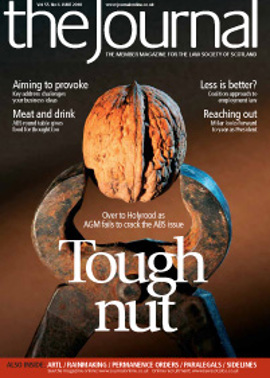Scottish Solicitors' Discipline Tribunal

John Atuahene and Richard Thomas Thorburn
A complaint was made by the Council of the Law Society of Scotland against John Atuahene, solicitor, Paisley and Richard Thomas Thorburn, solicitor, Carluke (“the respondents”). The Tribunal dismissed the second respondent’s preliminary pleas of ultra vires and relevancy and continued consideration of a plea of oppression until the substantive hearing.
The Tribunal considered that the plea of oppression could not be determined without the hearing of evidence. In relation to the plea of relevancy, from its consideration of the record, the Tribunal was of the view that there were clear statements of factual breaches contained in the complaint as amended and also clear statements of duty on the second respondent, which were substantially accepted, and there were clear averments that these breaches amounted to professional misconduct.
In relation to the plea of ultra vires, the second respondent submitted that s 35 of the Solicitors (Scotland) Act 1980 requires that there be separate “Accounts Rules”. The Tribunal however considered that the term “Accounts Rules” is only a term of reference within the Act. There is not a stipulation that the “Accounts Rules” must be contained in a separate set of rules apart from any other promulgated by the Council of the Law Society of Scotland in pursuance of the statutory powers generally. In the judgment of the Tribunal, when the complainers carry out inspections they are doing so in terms of their general powers and not specifically in relation to the “Accounts Rules”. The requirement to have “Accounts Rules” is met by the existence of the 2001 Rules. The Tribunal considered that the application and enforcement of these rules was a matter for evidence.
John Atuahene and Richard Thomas Thorburn
A complaint was made by the Council of the Law Society of Scotland against John Atuahene, solicitor, Paisley (“the first respondent”) and Richard Thomas Thorburn, solicitor, formerly of Carluke and now of Glasgow (“the second respondent”). The Tribunal repelled the second respondent’s plea of oppression; found the first respondent guilty of professional misconduct either singly or in cumulo in respect of his repeated failure to respond to the reasonable enquiries of the Society, his repeated failure to comply with notices served on him by the Society, his failure to implement mandates and his failure to respond to fellow solicitors, his failure to arrange effective registration of the title of a client and the security in relation to that client’s loan, his failure to provide a signed assignation of lease and deliver an extract, his breach of rules 4, 8, 9, 10, 11 and 24 of the Solicitors (Scotland) Accounts etc Rules 2001, his repeated delay or failure to stamp, record or register timeously dispositions, standard securities and discharges, and his failure to comply with the Solicitors (Scotland) Professional Indemnity Insurance Rules 1995 by operating without professional indemnity insurance; and found the second respondent guilty of professional misconduct either singly or in cumulo in respect of his failure to reply to the reasonable requests of the Society for information, his breach of rules 4, 6, 8, 9, 10, 11 and 24 of the Solicitors (Scotland) Accounts etc Rules 2001, his repeated delay or failure altogether to stamp, record or register dispositions, standard securities and discharges, and his failure to comply with the Solicitors (Scotland) Professional Indemnity Insurance Rules 1995 by operating without professional indemnity insurance.
The Tribunal ordered that the names of the first and second respondents be struck off the Roll of Solicitors in Scotland.
The Tribunal heard evidence over 22 days in respect of this case and took five days to consider its decision, given the detailed and complicated nature of the matters in dispute. The Tribunal made a number of deletions from the complaint but was satisfied beyond reasonable doubt on the basis of the evidence led, that the majority of the averments in the complaint were proved. The Tribunal found that when the first respondent took over Murray & Co, the situation at his office was one of disarray and confusion. The Tribunal considered that a competent solicitor would not have got himself into such a mess and would not have continued in practice with matters in such a state of chaos. The Tribunal was extremely concerned by the fact that there were so many matters that were brought to light by repeated inspections of the Society over a long period of time.
The first respondent did not seem to learn from his past mistakes. The first respondent repeatedly breached a number of the Accounts Rules whilst a sole practitioner and again when in partnership with the second respondent. He failed to have proper money laundering procedures in place, failed to protect the interests of clients and lenders by delay in recording deeds and also engaged in a persistent course of conduct of failing to respond to the Society and other firms of solicitors. The Tribunal was also particularly concerned by the first respondent operating for an extended period without professional indemnity insurance cover. The Tribunal considered that the first respondent had shown himself to be hopelessly incompetent and to lack the core skills required to be a solicitor. It was the scale and the repetitive nature of the breach of Accounts Rules and his continuing to act in the same manner despite advice from the Society that caused the Tribunal serious concern.
The Tribunal also noted that the first respondent did not seem prepared to take responsibility for what happened. The Tribunal considered that given the serious nature of the conduct and in order to protect the public the first respondent’s name should be struck from the Roll of Solicitors in Scotland.
In connection with the second respondent the Tribunal was again concerned by the fact that there were repeated inspections over a long period of time, and that the same matters came to light time and time again despite the second respondent’s failures being brought to his attention. The second respondent did not seem to learn from his mistakes. The Tribunal noted that the second respondent had employed staff but had not put them through the books and had paid them in cash. The second respondent also appeared to believe that it was acceptable to run his business without maintaining the books and accounts of his firm in such a fashion that the true financial position of the firm was shown and this caused the Tribunal extreme concern.
The second respondent showed an unwillingness to comply with the rules of his professional body and seemed to have devoted his attention to challenging the Society’s interpretation of the Accounts Rules rather than trying to work with the Society to resolve the issues which had arisen at the various inspections. The second respondent also failed to have proper money laundering procedures in place. The second respondent had numerous failings in respect of the way he ran his firm when he was a sole practitioner and these failures continued when he was in practice with the first respondent. He also failed to protect the interests of lenders and clients by delay in recording deeds. He also operated in business without professional indemnity insurance for an extended period. The Tribunal considered that in order to protect the public the second respondent’s name should be struck from the Roll of Solicitors in Scotland.
Section 42A appeal – Graeme Stark Herald
An appeal under s 42A was made by Graeme Stark Herald, solicitor, Edinburgh (“the appellant”). The Tribunal found the appeal so irrelevant and lacking in specification as to be manifestly ill founded and dismissed the appeal. The Tribunal confirmed the determination and direction of the Council of the Law Society of Scotland dated 21 July 2009.
The Tribunal considered that the appeal as lodged by the appellant was extremely skeletal in nature and did not give the Society any notice of the case that it required to answer. The appellant had been called upon to expand on his grounds of appeal by the Society in its answers. The appellant did not expand on his grounds of appeal and also failed to attend the Tribunal hearing to pursue his appeal. In the circumstances the Tribunal had no hesitation in finding that the appeal was so irrelevant and lacking in specification as to be manifestly ill founded.
John Gerard O’Donnell
A complaint was made by the Council of the Law Society of Scotland against John Gerard O’Donnell, solicitor, 15 Clarkston Road, Glasgow (“the respondent”). The Tribunal found the respondent guilty of professional misconduct in respect of his permitting his own personal interest to influence his acting on behalf of a client, his failure to act on his client’s irrevocable instructions and in direct conflict with those irrevocable instructions by his borrowing £60,000 from his client rather than paying the sum to the brother of the client in terms of the mandate, and his borrowing £60,000 from his client in breach of rule 21 of the Solicitors (Scotland) Accounts etc Rules 2001.
The Tribunal censured the respondent and directed in terms of s 53(5) of the Solicitors (Scotland) Act 1980 that for a period of five years any practising certificate held or issued to the respondent shall be subject to such restriction as will limit him to acting as a qualified assistant to such employer as may be approved by the Council or the Practising Certificate Committee of the Council of the Law Society of Scotland, said restriction to run concurrent with his existing restriction.
The Tribunal noted that the respondent was already subject to a restriction on his practising certificate for a period of five years from June 2009. The Tribunal took a very serious view of the borrowing by the respondent of a large sum of money (£60,000) without the consent of the clients and in clear breach of the Accounts Rules. Although this fell short of theft, it had potentially serious consequences and was certainly not, as had been contended by the respondent, a victimless crime. The Tribunal only refrained from striking the respondent’s name from the Roll because the clients did not themselves complain and had suffered no loss, there were significant extenuating circumstances in regard to the respondent’s age and health, and the respondent had co-operated fully with the complainers and had entered into a joint minute. In these exceptional circumstances it was felt that a further restriction on the respondent’s practising certificate, to run concurrently with the existing restriction, would provide adequate public protection.
The Tribunal also issued five orders under s 53C(2) of the Solicitors (Scotland) Act 1980.
In this issue
- Embrace "the new lawyer", mediation expert will tell conference
- Best practice governance for family businesses: a new dawn
- Spanning the divide
- Action on Gill review
- A House divided?
- Get it right first time
- Views from the front line
- Push for change
- "If ABSs are the answer, what's the question?"
- Common cause
- Shaping a new life
- Essential artl
- Smart bows out at AGM
- It's the final countdown
- Law reform update
- Ask Ash
- Here comes the rain again...
- True or false?
- Journey's end
- Win some, lose some
- Forget getting paid!
- Thumbs up for Google?
- A sporting result?
- Buying into good causes
- Scottish Solicitors' Discipline Tribunal
- Website review
- Book reviews






